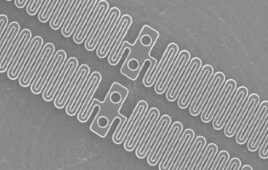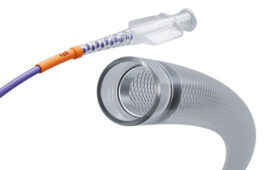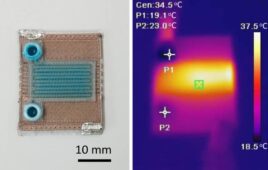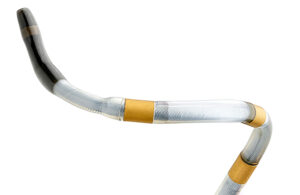
The Medtronic Symplicty Spyral renal denervation (RDN) catheter delivers radiofrequency energy from four electrodes to ablate nerves in the renal arteries and treat high blood pressure. The nitinol-based device expands in a spiral pattern inside the blood vessel. [Image courtesy of Medtronic]
Medtronic renal denervation leaders Jason Weidman and Sean Salmon discuss RDN’s potential to help patients with atrial fibrillation (AFib).
As if treating an epidemic-level condition like hypertension wasn’t enough, renal denervation (RDN) also shows potential for atrial fibrillation (AFib) and other conditions related to high blood pressure.
In interviews with Medical Design & Outsourcing, Medtronic EVP Sean Salmon and SVP Jason Wediman discussed whether their Spyral Symplicity radiofrequency (RF) catheter ablation technology could help AFib patients when paired with cryoablation.
Weidman — president of Medtronic’s coronary and RDN business — said results from the Symplicity AF study will be published shortly. That study compares cryoablation for pulmonary vein isolation (PVI) to treat AFib with and without renal denervation.
“There are a lot of scientific reasons to think [RDN] could help with other types of conditions,” Weidman said. “In the early days, there were a lot of what I would call hypothesis-generating studies looking at various different applications. We’re excited to kind of get back to some of those other areas.”
Pairing minimally invasive RDN with cryoablation “is an area that we are interested in and it’s obviously complementary to our [cardiac ablation solutions] business at Medtronic,” Weidman said.

Medtronic SVP and President of Coronary and Renal Denervation Jason Weidman [Photo courtesy of Medtronic]
“There’s a number of other areas and even possibly some variations of the approach for hypertension that we’ll be looking at here over the next 12-18 months,” he continued. “So stay tuned.”
Weidman wouldn’t share more on the hypertension variations, and a spokesperson declined to say when the study results would be published.
More from Weidman: What Medtronic learned on its long road to RDN approval
“I won’t spoil the trial results for you,” Sean Salmon said in a later interview. He’s the president of Medtronic’s cardiovascular portfolio, which includes RDN and cardiac ablation for AFib.
On the AFib front, Medtronic’s ablation therapy devices include the Arctic Front family of cryoablation catheters, the PulseSelect pulsed-field ablation (PFA) system, and the Affera Sphere-9 diagnostics and ablation catheter, which uses both RF ablation and PFA.
Previously: Why Affera’s cardiac ablation technology is worth $1B to Medtronic

Medtronic EVP and Cardiovascular President Sean Salmon [Image courtesy of Medtronic]
Beyond whether RDN can improve cryoablation therapy for treating AFib patients, there’s also the question of whether RDN can help prevent AFib, since hypertension is one of the largest risk factors for AFib.
“When you stretch the atrium, it gets scarred up — pressure does that,” Salmon said. “And then there are triggers which are more sympathetically modulated, so you have this overdrive of your sympathetic modulation that can cause you to get into AFib arrhythmias.”
In 2022, Medtronic published results of a sham-controlled RDN study of hypertensive heart disease patients, whose chronically high blood pressure changes the structure of their hearts.
“Your left ventricle blows up, it gets thick from the pressure load, and then your left atrium starts to blow up,” Salmon said. “… We measured with loop recorders whether or not those patients went on to develop atrial arrhythmia. And they didn’t. It was pretty remarkable. Even independent of the blood pressure effect, you saw this benefit.”
Medtronic — the world’s largest device manufacturer — is looking at other cardiovascular conditions with high sympathetic drive that need to be modulated.
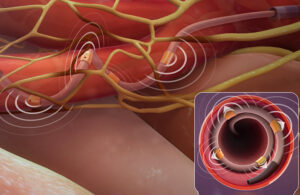
Medtronic’s Symplicity Spyral renal denervation (RDN) ablation catheter expands inside the renal arteries to apply energy that calms overactive nerves that help regulate blood pressure. [Illustration courtesy of Medtronic]
“There’s a lot of this sort of physiology between the nervous system and high blood pressure and different disease conditions. There’s other things that have high sympathetic drive too, including heart failure. That might be too far gone. We don’t know,” he said. “Chronic kidney disease is another one — we don’t know yet. We’ve only studied with [glomerular filtration rates] above 40.”
Recor Medical, which in November 2023 won FDA approval for its own RDN system to treat hypertension shortly before Medtronic, is also looking into other applications for the technology, CEO Lara Barghout said in an interview.
A pooled analysis of RDN on hypertensive patients with AFib found benefits of combining PVI with RDN, according to researchers in Ireland — where, coincidentally, Medtronic will manufacture its RDN catheters.
“RDN may serve as an innovative intervention in the treatment of AF,” the researchers said in their analysis, published in the Journal of Human Hypertension (links to the studies they considered are listed in the references section).

